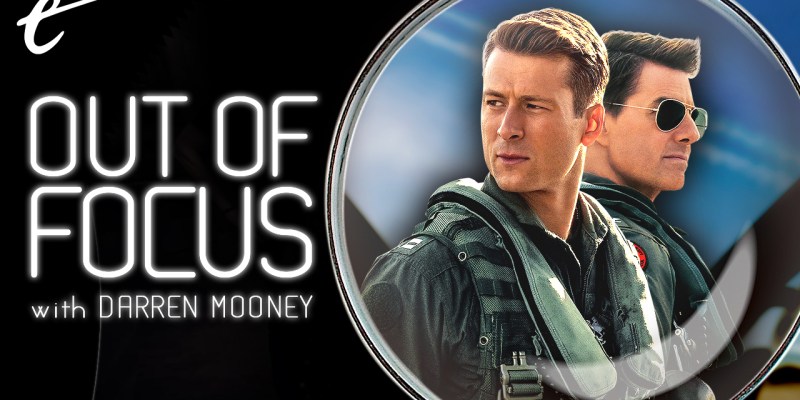Glen Powell should be a movie star.
A lot has been written over the past decade or so about how Hollywood has failed to produce a new generation of movie stars to replace ageing veterans like Tom Cruise or Leonardo DiCaprio. However, to anybody watching movies, the problem is not a lack of talent. There are plenty of young actors who have the raw potential, something that could be harnessed into a compelling screen persona that could attract audiences and even develop with them over decades.
Most casual viewers will recognize Powell from Top Gun: Maverick, where he played the conceited fighter pilot Jake ‘Hangman’ Seresin. It’s pure swagger, and the film even goes out of its way to give Powell’s supporting character his own miniature arc in which he learns to be just a little bit less self-centered. However, Powell has been around for over a decade at this point. It’s frustrating that Maverick was the first time many viewers noticed him and that it may even be the peak of his career.
Powell started as a child actor and worked his way through the trenches. There is some retroactive recognition of his role as a sleazy stock trader in The Dark Knight Rises. However, he seemed to arrive with the release of Richard Linklater’s Everybody Wants Some!! in 2016, a charming hangout movie following a set of young men and one woman in the week before college begins. Powell has enjoyed a steady relationship with Linklater, appearing in Apollo 10 ½: A Space Age Childhood and Hit Man.
Powell has put in a lot of the work that one might expect from an emerging young talent. He had a memorable supporting role playing a real-life celebrity in Hidden Figures, cast as the charismatic astronaut John Glenn. He played the decoy romantic interest for Lily James in The Guernsey Literary and Potato Peel Pie Society, but really popped opposite Everybody Wants Some!! co-star Zoey Deutsch in Set It Up as a smug corporate personal assistant.
This year, Powell has garnered a great deal of attention as the lead character in Richard Linklater’s Hit Man, which almost feels like awards season counterprogramming to Michael Fassbender in David Fincher’s The Killer. Powell plays a police officer who goes undercover as a killer-for-hire, and who falls in love with a woman named Maddy (Adria Arjona). The festival reviews for Hit Man were effusive, with particular praise for Powell.

“Richard Linklater’s sexy comedy makes a star out of Glen Powell,” raved The Hollywood Reporter. “Glen Powell makes a case for movie stardom in Hit Man,” contended Vanity Fair. “If Glen Powell’s not already a star, this movie will make him one,” hedged Vulture. A feature on the film from Associated Press included praise for the “movie-star turn by Glen Powell” in its headline. There was a palpable excitement to the coverage. Somebody who had done the work was getting the recognition.
Then Netflix swooped in and bought the distribution rights for Hit Man for $20m. While the deal reportedly includes stipulation for “a theatrical component”, that would seem to signal the end of any hope of Hit Man enjoying a significant release in cinemas. More than that, given that The Killer is a major awards contender for the streaming service, it seems highly unlikely that Hit Man will receive the same level of attention or publicity in the months ahead.
To a certain extent, this is business as usual for Netflix. Over the past decade or so, the streaming services have arrived at the major film festivals with an insatiable appetite and bottomless pockets, spending like “drunken sailors.” They hoover up titles for often absurd amounts of money. In 2019, Amazon spent $40m on three titles at Sundance. The following year, Netflix paid $35m for Malcolm & Marie at Toronto. In 2021, Apple bought CODA at Sundance for $25m.
Some of these titles do go on to massive success. Amazon paid $10m for Manchester by the Sea at Sundance in 2016, and became the first streaming service with a Best Picture nomination. CODA was the first film from a streaming service to win the Best Picture Oscar. However, many more fade into obscurity, often buried by the algorithm or released with no real push from a service that paid a frankly absurd amount of money for them.
This isn’t an abstract observation. Filmmakers feel the same way. “Apollo 10½, I loved that whole experience,” Linklater told Associated Press in an interview before Netflix sealed the deal on Hit Man. “It was such a personal experience. And then one day it showed up on a platform with no fanfare. It’s always kind of sad when you realize even your friends don’t know your film is out.” Given that even a token theatrical release adds value to a streaming title, it’s easy to get lost in the content churn.
After all, many of Powell’s best and most charming performances went straight to streaming rather than through the traditional distribution model. He was great in Hidden Figures, which earned an Academy Award nomination for Best Picture, but it was a supporting role. Audiences who wanted to see if Powell could carry a movie as a lead would have to find Set It Up on Netflix, a film which got somewhat lost amid a summer of streaming romantic comedies.

Discussions about the dearth of modern movie stars tend to focus on the kinds of major releases that make it into theatres, particularly intellectual-property-driven blockbusters. It seems that making blockbusters alone is not enough to transform a charismatic performer into a movie star, as demonstrated by the careers of actors like Chris Hemsworth and Chris Evans. This makes sense. Classic movie stars tended to build their personas by demonstrating talent across a variety of genres.
At a distance, Powell’s career echoes that of his Maverick co-star, Tom Cruise. Sure, Cruise was an action star in Top Gun, but he was also a precocious teenager in Risky Business, a romantic lead in Cocktail, a hotshot hustler in The Color of Money and an awards-caliber leading man in Rain Man. He could do all those things. However, those kinds of movies don’t tend to get major theatrical releases today, so there’s less opportunity for emerging talent to showcase the range of their star persona.
There is a broader question of whether streaming can make a star. Theoretically, it is a democratic medium that is more easily accessible. It pumps content into people’s homes. People can watch streaming anywhere on their phones or laptops. However, there are perhaps two key problems here. The first is just the sheer volume of content, which can devalue the form and make it harder to spot true talent. The second is that stardom was always built on a certain inaccessibility.
Stranger Things is one of the biggest shows in the world. While actors like Millie Bobbie Brown and Finn Wolfhard have certainly pursued interesting careers, they don’t feel like stars. Pedro Pascal headlines two of the biggest shows in the world, The Mandalorian and The Last of Us, but he was still cast as the character in awe of movie star Nicholas Cage in The Unbearable Weight of Massive Talent. No matter how much schlock Cage makes, there is a categorical difference between Cage and Pascal.
Powell is not a unique case. Later this year, Netflix will release the erotic drama Fair Play, which they snapped up from Sundance for $20m. Fair Play stars Alden Ehrenreich, another promising young performer who feels like a lost star. Ehrenreich was famously spotted in a bat-mitzva video by Steven Spielberg. He began his career working with directors like Francis Ford Coppola and Park Chan-Wook. He seemed like an actor who was destined to go places.

He broke out in the Coen Brothers’ Hail, Caesar! The movie’s second trailer was based entirely around Ehrenreich’s lovable cowboy actor Hobie Doyle. He’s great in the role. He’s charming, sweet, funny, earnest and vulnerable. That performance has aged very well. In the wake of all the controversy around Solo: A Star Wars Story, a film that felt like it should have been a launching pad for the actor, it’s affecting to watch Ehrenreich as a young star trying to navigate Hollywood.
Of course, Ehrenreich found his career derailed by the modern studio franchise machine, and was the subject of unpleasant rumors that Disney had brought in an acting coach, which Ehrenreich found himself having to address. Ehrenreich arguably spent the next five years trying to recover from it. This year, he really popped in Christopher Nolan’s Oppenheimer, playing an unnamed Senate aide who drives a lot of the film’s flashback structure and lands a real whopper at the movie’s climax.
For those lamenting the death of the movie star, the talent is obviously there. Powell broke out in Everybody Wants Some!!, a coming-of-age movie from Richard Linklater that recalled Dazed and Confused. That film is a hotbed for emerging 1990s talent: Milla Jovovich, Rory Cochrane, Adam Goldberg, Anthony Rapp, Cole Hauser, Ben Affleck, Parker Posey, Matthew McConaughey, Nicky Katt and Renée Zellweger. Everybody Wants Some!! contains its own deep bench of talent.
However, so much of that talent seems lost. Blake Jenner’s biggest role since was perhaps the streaming show What/If on Netflix. Tyler Hoechlin played Superman on the CW and in Superman & Lois, but seems unlikely to be considered a defining Man of Steel by mainstream audiences. Zoey Deutsch has worked more consistently than many of her co-stars, but her biggest roles tend to be on streaming. She was in Set It Up with Powell and was the second lead on Netflix’s The Politician.
Looking at this larger pattern, it’s clear that this movie star energy is getting syphoned off into various black holes. Would a theatrical release of Hit Man or Fair Play be enough on their own to make movie stars of Glen Powell and Alden Ehrenreich? It seems unlikely. It seems more realistic that they’d be stepping stones and calling cards in a larger body of work that could build cumulatively to the status of movie star. Instead, they wind up part of vast libraries of formless content.
Even stars can’t shine under those conditions.
